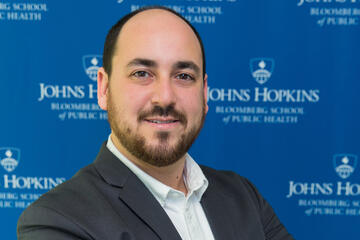The voices of Johns Hopkins University and Medicine researchers continue to be central to evolving news coverage of what the loss of federal support means for science.
Neuroscientist Rick Huganir told NBC News that any interruption in NIH funding could leave children with intellectual disabilities without a promising treatment.
"We're developing therapeutics for the kids and may have a therapeutic that could be curing these kids in the next several years, but that research is going to be compromised," Huganir said. "Any delay or anything that inhibits our research is devastating to the parents."
Tom Inglesby warned The Washington Post of the repercussions of ending the distribution of free COVID tests, a plan the Trump administration eventually reversed.
"Destroying an asset that was paid for by the American people, that doesn't make any sense," said Inglesby director of the Johns Hopkins Center for Health Security at the Bloomberg School of Public Health. "We need to be able to figure out who is sick, who is not sick, who needs medicine, who is, in fact, contagious, who may be someone who's vulnerable. These diagnostics really help you make really good decisions, help families make good decisions about how to stay healthy."
Erin Sorrell, a senior scholar at the Center for Health Security, talked to NBC News about implications for the fight against bird flu, saying: "If we don't act now, we're only giving the virus more opportunity to continue to adapt and potentially evolve into something more dangerous in a human population."
In a guest essay for The New York Times, Caitlin Rivers, senior scholar at the Center for Health Security, addressed the vaccine skepticism of new Health and Human Services Secretary Robert F. Kennedy Jr.
"What has been overlooked in discussions about Mr. Kennedy's future agenda is one key fact: Vaccines remain enormously popular. Given this broad support, politicians should think twice about targeting something so widely valued," she wrote. "That vaccines are popular should not dilute the importance of encouraging people to get them."
Paul Spiegel, director of the Johns Hopkins Center for Humanitarian Health, told The Washington Post cuts to foreign aid have been "devastating."
"There has already been much damage done that will be difficult to undo," he said. "The administration has not always done what they said they would do providing exceptions for humanitarian response, so the question remains: Will they allow funds to go out, or will they simply slow it down and the pain and suffering of all these vulnerable people around the globe will continue?"
On NPR's news program 1A, Otis Brawley, a Bloomberg Distinguished Professor of oncology and epidemiology, discussed what the federal funding cuts mean for medical research, noting that among the worst outcomes is that many community hospitals could drop out of clinical trials. And he said it could discourage young scientists who tend to do the groundbreaking work in everything from diabetes to infectious disease and cancer.
"The Nobel Prizes are awarded to people in their 50s for things they did 20 years earlier," he said. "What this is doing is discouraging young people from coming into the science, and quite honestly, it's going to give the Chinese an [upper hand]. It's going to take us 10 to 15 years to climb out of this hole if we continue digging it."
Posted in Health, University News









